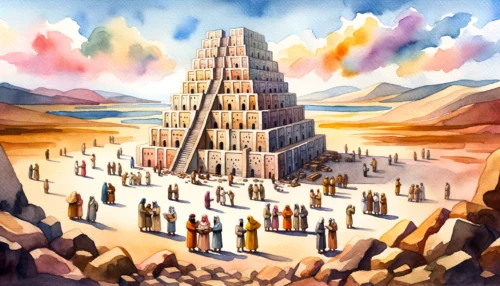The Bible is a source of inspiration and guidance for billions of people, but have you ever stopped to consider how Jesus and His apostles themselves saw the Scriptures? This article will provide a detailed exploration of their views on the Bible, drawing from both the Old and New Testaments. We’ll examine how Jesus and the apostles interpreted, applied, and taught the Scriptures in their lives and ministries. Join us on this journey to better understand the Biblical perspective of these foundational figures of Christianity.
Introduction to the Bible in Jesus and the Apostles’ Time
Before diving into how Jesus and the apostles viewed the Bible, it’s essential to recognize that the Bible they were familiar with was not the same as the one we have today. The Bible in their time referred mainly to the Hebrew Scriptures, also known as the Old Testament. It was the sacred text of Judaism and was written in Hebrew, with a few parts in Aramaic. It contained the Law, the Prophets, and the Writings, which were the foundational teachings of their faith. The New Testament, as we know it today, did not exist during their lifetimes. It was written and compiled later, starting with the letters of the apostles and followed by the Gospels.
The Hebrew Scriptures were organized into three main divisions:
- The Law (Torah): This section included the first five books of the Bible, known as the Pentateuch, and provided the legal and moral framework for the Jewish people. It contained the creation story, the patriarchs’ narratives, the Exodus, and the Mosaic Covenant, along with numerous laws and commandments.
- The Prophets (Nevi’im): This division encompassed the historical and prophetic books, which told the story of Israel’s history and the prophets’ messages. It included books such as Joshua, Judges, Samuel, Kings, Isaiah, Jeremiah, and Ezekiel.
- The Writings (Ketuvim): This section consisted of a diverse collection of books, including poetry (Psalms and Lamentations), wisdom literature (Proverbs, Job, and Ecclesiastes), and other writings like Esther, Daniel, Ezra, and Chronicles.
During Jesus and the apostles’ time, the Hebrew Scriptures were read and studied in synagogues, which were local centers for Jewish worship, education, and community life. People gathered there to pray, read, and discuss the Scriptures, and to receive teaching from rabbis and other knowledgeable individuals. The study of the Scriptures was a central part of Jewish life, and many Jews committed significant portions of the text to memory.
It is in this context of a deep engagement with the Hebrew Scriptures that we can begin to understand how Jesus and the apostles viewed and interacted with the Bible. Their perspectives were shaped by the religious and cultural environment of their time, and their understanding of the Scriptures played a crucial role in their lives and ministries.
Jesus’ Relationship with the Scriptures
As a devout Jew and a rabbi, Jesus had an intimate relationship with the Scriptures. His teachings and actions frequently drew upon the Hebrew Scriptures, and He demonstrated a deep understanding of their meaning and significance. Jesus’ relationship with the Scriptures can be understood in two primary ways: as the fulfillment of prophecy and as the foundation for His teachings.
Jesus as the Fulfillment of Prophecy
A central aspect of Jesus’ relationship with the Scriptures was His role as the fulfillment of the Old Testament prophecies concerning the Messiah. The Hebrew Scriptures contained numerous prophecies about a coming Savior who would deliver God’s people and establish a new covenant. Jesus often pointed to these prophecies to demonstrate that He was the promised Messiah.
For example, in Luke 4:16-21, Jesus read a passage from the Book of Isaiah in the synagogue:
“The Spirit of the Lord is on me because he has anointed me to proclaim good news to the poor. He has sent me to proclaim freedom for the prisoners and recovery of sight for the blind, to set the oppressed free, to proclaim the year of the Lord’s favor.” (Isaiah 61:1-2)
After reading this passage, Jesus declared, “Today this Scripture is fulfilled in your hearing.” In this instance, as well as many others throughout His ministry, Jesus explicitly connected His actions and teachings to the Old Testament prophecies, showing that He was the fulfillment of God’s promises.
Jesus’ Use of the Scriptures in His Teachings
Another essential aspect of Jesus’ relationship with the Scriptures was His use of them as a foundation for His teachings. Jesus frequently quoted from the Hebrew Scriptures in His parables, sermons, and conversations with others. He used the Scriptures to provide context and authority for His message, as well as to challenge the religious leaders of His day.
One notable example of Jesus’ use of the Scriptures in His teachings is the Sermon on the Mount (Matthew 5-7). Throughout this sermon, Jesus referenced various Old Testament laws and teachings, such as the Ten Commandments and the teachings of the prophets. He then expanded upon these teachings, deepening their meaning and challenging His listeners to a higher level of righteousness and obedience to God.
Jesus also used the Scriptures to respond to challenges and questions from the religious leaders. For instance, when the Pharisees questioned Him about the greatest commandment, Jesus replied by quoting from Deuteronomy 6:5 and Leviticus 19:18, stating, “Love the Lord your God with all your heart and with all your soul and with all your mind. This is the first and greatest commandment. And the second is like it: Love your neighbor as yourself. All the Law and the Prophets hang on these two commandments” (Matthew 22:37-40).
By consistently grounding His teachings in the Hebrew Scriptures, Jesus demonstrated His reverence for God’s Word and His commitment to its ongoing relevance and authority in the lives of His followers.
The Apostles’ Understanding of the Bible
As Jesus’ closest followers, the apostles were profoundly influenced by His teachings and understanding of the Scriptures. They came to view the Hebrew Scriptures through the lens of Jesus’ life and teachings, recognizing Him as the fulfillment of the Old Testament prophecies. The apostles’ understanding of the Scriptures can be examined by looking at their background in the Jewish Scriptures and how they connected the Old and New Testaments.
The Apostles’ Background in the Jewish Scriptures
The apostles, like Jesus, were Jews who had grown up learning the Hebrew Scriptures. They were familiar with the stories, laws, and prophecies contained in the Old Testament and likely had memorized significant portions of the text. As a result, their understanding of Jesus’ teachings and actions was deeply rooted in the Hebrew Scriptures. When Jesus called them to follow Him, their knowledge of the Scriptures helped them recognize Him as the Messiah and understand the significance of His teachings.
During their time with Jesus, the apostles continued to learn from Him, deepening their understanding of the Scriptures. Jesus often explained how the Old Testament prophecies and teachings pointed to Him, and He instructed the apostles on how to apply these truths in their lives and ministries. After Jesus’ death and resurrection, the Holy Spirit further guided the apostles in their understanding of the Scriptures, enabling them to proclaim the gospel and establish the early Christian church.
How the Apostles Connected the Old and New Testaments
The apostles played a pivotal role in connecting the Old and New Testaments by demonstrating how the Hebrew Scriptures pointed to Jesus as the Messiah. In their letters and the Gospels, they frequently quoted from the Old Testament to show how it foreshadowed and prophesied Jesus’ life, death, and resurrection.
For example, the apostle Paul, in his letter to the Romans, wrote, “For I am not ashamed of the gospel, because it is the power of God that brings salvation to everyone who believes: first to the Jew, then to the Gentile. For in the gospel the righteousness of God is revealed—a righteousness that is by faith from first to last, just as it is written: ‘The righteous will live by faith.'” (Romans 1:16-17). Here, Paul quoted from Habakkuk 2:4 to demonstrate that the core message of the gospel—salvation by faith—was rooted in the Old Testament.
The apostle Peter, in his sermon on the day of Pentecost, also connected the Old and New Testaments by quoting from the prophet Joel:
“In the last days, God says, I will pour out my Spirit on all people. Your sons and daughters will prophesy, your young men will see visions, your old men will dream dreams” (Acts 2:17, quoting Joel 2:28).
Peter explained that the outpouring of the Holy Spirit on the believers was a fulfillment of Joel’s prophecy, highlighting the continuity between the Old Testament and the new era ushered in by Jesus.
By connecting the Old and New Testaments in their teachings and writings, the apostles demonstrated that the story of Jesus was not a separate narrative, but rather the fulfillment and continuation of God’s plan of salvation as revealed in the Hebrew Scriptures.
The Bible’s Role in Early Christian Communities
The early Christian communities, guided by the apostles, relied heavily on the Hebrew Scriptures and the teachings of Jesus as they sought to understand and live out their faith. The Scriptures played a central role in the worship, education, and spiritual growth of these communities, shaping their beliefs and practices in significant ways.
Studying and Learning from the Scriptures
The early Christians, many of whom were Jewish converts, continued the Jewish tradition of studying and learning from the Scriptures. They gathered in homes, synagogues, and other meeting places to read, discuss, and pray over the Hebrew Scriptures. They sought to understand the meaning of the text and to apply its teachings to their lives as followers of Jesus.
The apostles played a vital role in teaching the early Christians how to interpret and apply the Scriptures in light of Jesus’ life and teachings. They explained how Jesus fulfilled the Old Testament prophecies and how the new covenant established by His death and resurrection transformed their understanding of God’s promises and requirements.
The Development and Circulation of the New Testament
As the early Christian communities grew and spread, the apostles and other early Christian leaders began to write letters to address specific issues, offer encouragement, and provide instruction in the faith. These letters, along with accounts of Jesus’ life and teachings, eventually became the New Testament.
The apostle Paul, for example, wrote letters to various churches, such as those in Corinth, Galatia, and Ephesus, to address concerns and offer guidance. Other apostles and early Christian leaders, like Peter, James, and John, also wrote letters to encourage and instruct believers. These letters, which were often circulated among the churches, became an essential part of the early Christians’ understanding of their faith and practice.
In addition to the letters, the Gospels—Matthew, Mark, Luke, and John—were written to provide an account of Jesus’ life, death, and resurrection. These Gospels, which were based on the eyewitness testimony of the apostles and other early followers of Jesus, offered a detailed and coherent narrative of Jesus’ teachings and actions.
Incorporating the New Testament into Early Christian Worship and Study
As the New Testament writings began to circulate among the early Christian communities, they were gradually incorporated into their worship and study of the Scriptures. The apostles’ letters and the Gospels were read aloud in public gatherings, alongside the Hebrew Scriptures, and were discussed and applied to the believers’ lives.
The early Christians recognized the authority of the apostles and their writings, viewing them as inspired by the Holy Spirit and consistent with the teachings of Jesus. Over time, the New Testament writings became accepted as part of the canon of Scripture, alongside the Hebrew Scriptures, forming the basis for the Christian faith and practice.
By studying and applying both the Old and New Testaments, the early Christian communities sought to live out their faith in a way that was faithful to the teachings of Jesus and the apostles, while also rooted in the rich heritage of the Hebrew Scriptures.
Finding Your Place in the Story
As we’ve explored how Jesus and the apostles viewed the Bible, we can see the profound impact their understanding had on shaping Christianity and how it remains relevant today. As you continue to engage with the Scriptures, consider these questions to deepen your own understanding and connection to the Bible:
- How does knowing Jesus as the fulfillment of Old Testament prophecies impact your faith and understanding of the Bible?
- In what ways can you make studying the Bible a more central part of your daily life and spiritual growth?
- How can you apply the teachings of Jesus and the apostles in your own life to better love God and your neighbor?
Remember, the Bible is not just a historical document, but a living testimony of God’s love and plan of salvation for humanity. As you study the Scriptures and walk in the footsteps of Jesus and the apostles, may you find your place in this grand story and be inspired to live out your faith with passion, courage, and love.
God’s Word is a lamp to our feet and a light to our path (Psalm 119:105). May it illuminate your journey and guide you ever closer to the heart of God.














